Need Advice On Heat Pumps? Read Best Heat Pump Brands for 2021
Updated 2/8/21: Top 10 Air Conditioners blog post, plus one extra!
Longevity in the niche, superior quality, and versatility are the hallmarks of the best air conditioner brands. But there is a rub. An excellent brand that will work fantastic in your neighbor’s home may not be the right solution for your HVAC needs. Here is what you need to know.
Before Looking at the Best Air Conditioner Brands, Know What Your Needs Are
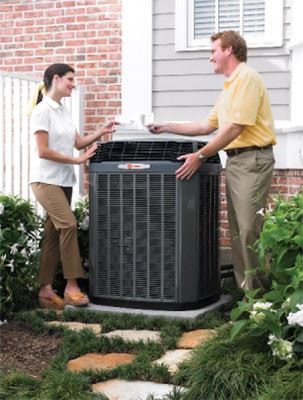 Air conditioners come in different sizes. Know ahead of time what size your home needs. If you buy a system that is too small, not even the best brand on the market will satisfy you.
Air conditioners come in different sizes. Know ahead of time what size your home needs. If you buy a system that is too small, not even the best brand on the market will satisfy you.
Moreover, know the features that you feel comfortable with. Some machines now come with quite a few bells and whistles. If you are not comfortable with high-tech gadgetry, a different brand with fewer features may be a better choice.
 American Standard Heating & Cooling
American Standard Heating & Cooling
American Standard, member of the Ingersoll Rand Group, classifies their air conditioning units into Platinum, Gold, and Silver, levels and are rated based on efficiency, comfort and cooling stages. Their AccuComfort™ technology offers variable speed operation that allows the system to consistently adjust to run at a more efficient speed. Couple this feature with up to a 22.00 SEER rating, American Standard offers one of the most efficient multi-stage cooling units on the market.
Cons: Most of the Silver and Gold models are only one-stage units and are not up to the same efficiency ratings as their Platinum models.

Amana Heating & Air Conditioning
Amana is one of the most famous names in air conditioning. It is also a subsidiary of Goodman. The firm offers a broad range of SEER ratings that range from 13 to 18. Most experts agree that a 16 is an ideal setting for the majority of residential buyers. The company seeks to quiet its systems with insulation. Another plus is the compatibility with ComfortNet home monitoring devices.
Cons: Warranties for various models vary. Moreover, much of the equipment is very similar to what Goodman sells – at a lower rate.
 Bryant Heating and Air Conditioning
Bryant Heating and Air Conditioning
This firm offers the flexibility of rooftop and standard central air conditioner systems. Models typically carry the Evolution and Legacy names. Customers like the AeroQuiet system, which reduces some models’ operational noises to just about 68 decibels. Another selling point is the high-tech thermostat that lets you program your heating and cooling needs for several days in advance. Add humidity control, and you can be comfortable without having to make daily adjustments.
Cons: Bryant and Day & Night have the same technology for some models. Even so, this brand typically costs a little more.
 Carrier
Carrier
The air conditioner models that the company features at this time include Infinity, Performance, and Comfort. Performance models are excellent options for homeowners who favor a deck installation. Models run at 67 decibels and offer an 18 SEER rating. For technophiles, the Infinity series offers plenty of gadgetry to play with for peak system performance and comfort.
Cons: Despite being highly rated for durability, Carrier does not offer great warranties – 5 years on most Comfort models and 10 years on Infinity and some Performance models.
 Goodman Manufacturing
Goodman Manufacturing
Buying from firm means that you are buying an American product. The company assembles its models in the United States. Founded in 1975 in Texas, it is now a subsidiary of the Daikin Group, which is a Japanese air conditioning company. Featuring machines in the 13 SEER to 18 SEER performance bracket, top models come with lifetime limited warranties and ten-year parts limited warranties. Many of these models are also Energy Star partners.
Cons: Some people have found that less expensive systems break down sooner than expected. Thanks to the warranty, an early equipment failure does not put a hole in your budget.
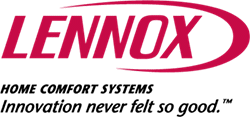 Lennox
Lennox
This firm has been a thought leader in its niche for a long time. The company excels in the creation of innovative products. It is fair to say that you get what you pay for with this manufacturer. Less expensive systems are louder than their more expensive counterparts.
Cons: Lennox parts are not the same ones you find on other air conditioner models. This means waiting periods to get what you need from the manufacturer. And since these machines are on the high-tech end of things, it is possible for components to fail more frequently.
Mitsubishi Electric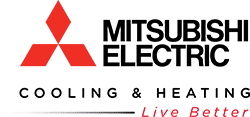
Mitsubishi is famous for its electronics. Few realize that the company has been selling HVAC products in the United States since the 1980s. Environmental concerns are a big deal for this company. If you want a 30.5 SEER system, this is the business that makes it. Energy Star certifications are par for the course.
Cons: Mitsubishi is not cheap. Efficiency comes at the cost of installing a ductless system. For the granny flat above the garage, this is not a big deal. For a five-bedroom house, it will set you back some money.
 Rheem
Rheem
Rheem brands its products with the tagline, “A new degree of comfort.” The company is best known for its two-stage air conditioning units. Active communication between the system and the user is a significant aspect of enjoying all the functions and savings the product provides. That said, people who do not like interacting with the system could opt for a different model that automates most processes without requiring user input.
Cons: Some homeowners have complained that the units are louder than they anticipated. Typically, this happens with systems that do not feature the composite base.
RUUD 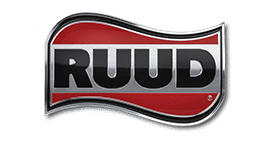
If you want a reliable, efficient air conditioner you should consider the products offered by RUUD.
With plenty of different options, choosing the right air conditioning system for your home may feel daunting, but don’t fret – RUUD has a range of air conditioner products to meet most residential cooling needs.
Cons: RUUD air conditioners are inexpensive to purchase and maintain. However, many customers and dealers complain that they don't offer enough high-efficiency or high SEER rated options.
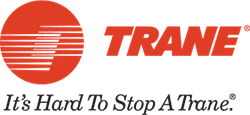 Trane
Trane
Commercial facilities trust their cooling needs to Trane. However, many consumers are surprised to learn that this firm also manufactures products for home use. High SEER ratings and favorable warranties endear this brand to the buyer. Because these systems allow for extreme fine-tuning, it is vital to have an expert help you select the right size for the location. Doing so amplifies your savings and enjoyment of the product.
Cons: Some models are similar to American Standard products, which is a brand the firm owns. Moreover, it can take a little while to receive warranty service.
 York
York
Affinity and York are this manufacturer’s current model series. It is fair to say that Affinity is the flagship model. Parts are easy to get, and the ten-year compressor and parts warranties make these systems good buys. Some models are suitable for stacking, which is another plus for the brand.
Cons: Operating these models is easy to do. There are fewer of the technological options that endear the high-tech models to homeowners who like to pre-program days or weeks of cooling.
How to Base a Buying Decision on a List of the Best Air Conditioner Brands for 2020
 Remember that a high-tech unit is only suitable for a buyer who wants to deal with the technology on a daily basis. Some people are more comfortable with a very basic setup that does not call for programming.
Remember that a high-tech unit is only suitable for a buyer who wants to deal with the technology on a daily basis. Some people are more comfortable with a very basic setup that does not call for programming.
Moreover, sizes of the compressors and running noises matter when you have limited installation options.
Rather than buying a system because it is on the top ten list, talk to your trusted HVAC installer to find out what type of machine would work best for you.
AirPlus Heating, Cooling & Electrical would be happy to provide you with an honest estimate on your HVAC installation. Fill out the form below or call us to schedule a free estimate on your new installation!
Need Advice On Heat Pumps? Read Best Heat Pump Brands for 2021
The post 2021’s Top 10 Best Air Conditioner Brands appeared first on HVAC Services Lorton | AirPlus Heating & Cooling.
.2309121422550.png)
